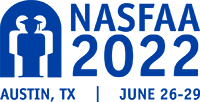The Bias in Funding Higher Education: How Obstacles Impact Students and What You Can Do
By Hugh T. Ferguson, NASFAA Senior Staff Reporter
Moderator:
Yvonne Campbell, Associate Director at the University of Texas at Arlington
Speakers:
Lauren Klink, Associate Director of Special Awards at the University of Wisconsin-Madison
Joselyn Diaz-Valdes, FASTrack & BANNER Manager for the Office of Student Financial Aid at the University of Wisconsin-Madison
Katy Weisenburger, Assistant Director of Federal Awards at the University of Wisconsin-Madison
An important component of financial aid is to help prospective students overcome barriers to embarking on their higher education careers, but one hurdle that plagues many can stem from bias.
In a presentation from the University of Wisconsin-Madison, a group of financial aid professionals provided a detailed review on how bias can impact students who apply for scholarships, the bias within the FAFSA, and examples from the field.
From working through the process of applying to financial aid, applying to scholarships, and general day-to-day interactions with students many students are faced with increased pressure to try to navigate the student aid system.
As an example, applying to financial aid for first-generation students comes with specific challenges, be it language barriers, accessing identification data, or feeling comfortable that personal information that is disclosed will be protected.
The panelists highlighted how NASFAA members could go about meeting students where they are in the application process and how important it is to have an openness in assisting students who need to work through these hurdles.
The speakers also detailed how bias shows up in financial aid spaces, and the importance of making sure your personal biases do not interfere with your decision-making process — especially as it relates to scholarship and aid.
During the conversation with the audience, attendees were able to engage in personal conversation to foster learning and increasing knowledge to help promote a more equitable playing field for students.
The goal of the session is to promote small adjustments in financial aid professionals behavior and how those small tweaks can have larger impacts — one small change could be a snowball to reducing barriers.
Publication Date: 6/28/2022

You must be logged in to comment on this page.